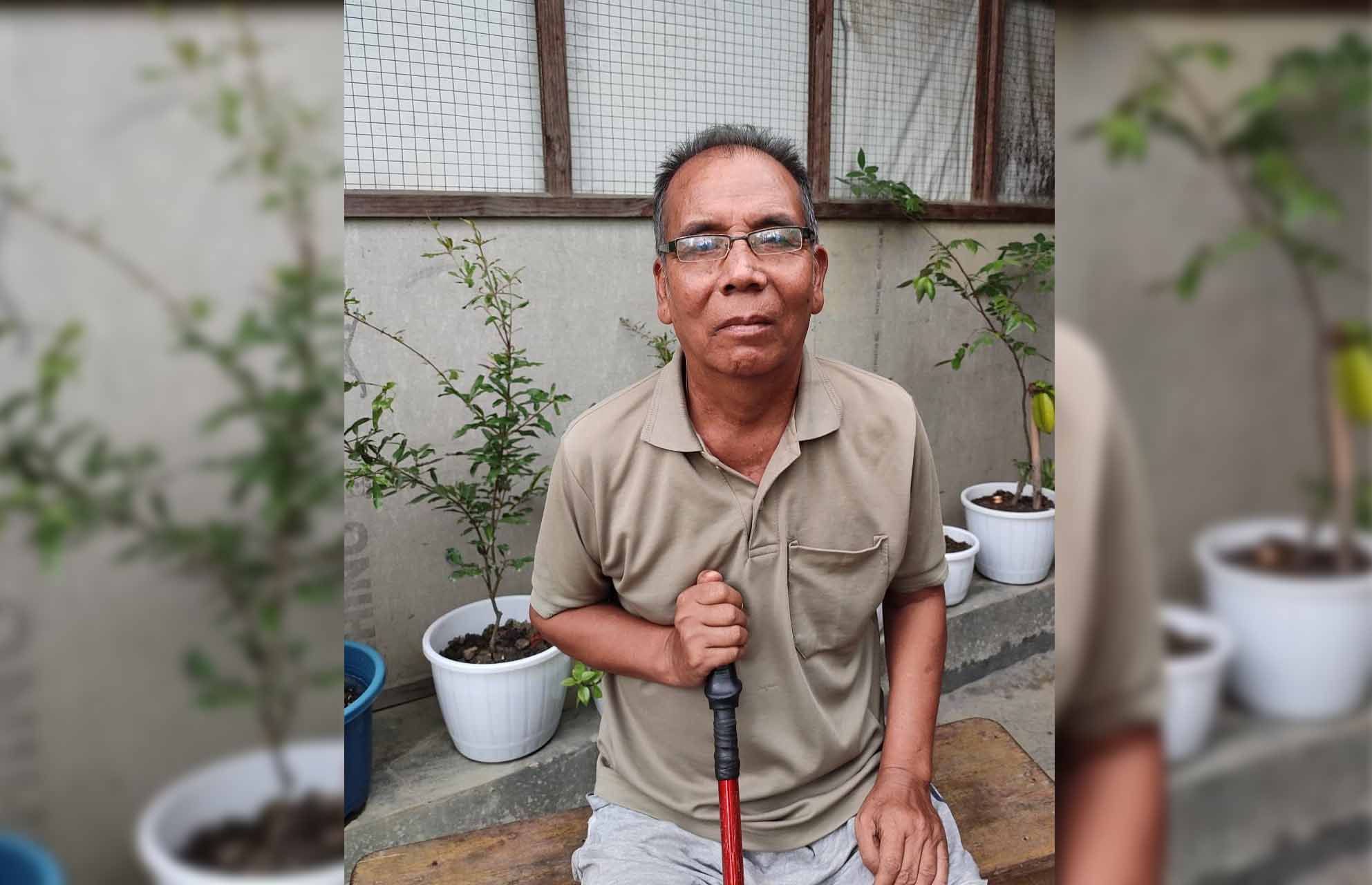Haobijam Tomba Meitei is a renowned playwright, play-actor and director of Shumang Lila, all in one, and belongs to Bamon Kampu Mayai Leikai. Shumang Lila is a traditional traveling theatre form unique to Manipur, and it is performed on open stages with audience all around them.

Tomba is a recipient of the Manipur State Shumang Lila Council award for the Best Script Writer in 1984 for his work “China Leikol Sanarei”. This play also won him the Best Producer award the same year.
In 1993, the Shumang Lila maestro again won the Best Producer award of the Manipur State Shumang Lila Council for another very popular play “Leichal Ahumgi Nachom”.
The first of his award winning Shumang Lila, “China Leikol Sanarei” tells of two bosom friends, Meiteingamba and Salaingamba who together joined the revolutionary movement raging in Manipur in their time. As years pass by, Meiteingamba was blessed with twin daughters, Komberei and Sanarei. One of the sisters, Sanarei, was given in adoption to Salaingamba as the latter was barren and childless.
Fortune turned in the revolutionary organization in the meantime and Salaingamba and his family had to move to China and ultimately became citizens of that country.
Years down the line, fate again had tragedy in store for Meiteingamba. His other daughter, Kombirei was brutally shot dead on her wedding night by a police officer obsessed with her and angry at his advances being rebuffed. Her groom, Anutab was so upset that he loses his mental balance. After some years, as destiny would again have it, Anutab travelled to China as part of a cultural troupe in an exchange programme. There by a very happy coincidence, he meets his wife’s twin sister, and the two fall in love at first sight and soon marry. The killer police officer who murdered Kombirei again interferes and tries to kill Sanarei as well.
Fortunately for the couple, just about this time, government investigation uncovers a treacherous secret identity of the rogue police officer and his crimes, and arrests him to finally award him the death sentence. Abutab and Kombirei’s story in this way has a happy ending.
His second award winning play “Leichal Ahumgi Nachom” is the story of three brothers who bring home wives from three different cultural and ethnic backgrounds. The family drama thus begin on an expected note of conflicts and tensions within the family with all three women trying to steer the family towards the culture each belongs. Quarrels become a daily routine and the family is in turmoil.
However, the three women and their husbands eventually come to their senses to realise that the best way forward for all of them was to accommodate each other in an amicable, give and take relationship. The three soon become like three different blossoms in a single bouquet, their individual colours and fragrances coming together to make the collective unique and charming.
The outstanding playwright has several other well acclaimed productions. Among them are: John Sankar )1975); China Leikol Sanarei (1984); Jat Onkhrabi (1985); Leichal Ahumgi Nachom (1993); Wakat Tugi Paokhum (1999); Echado Etambaktagi (2002); and more. In all, he has so far written more than 25 plays.
This reporter caught up with the talented but humble playwright, now in his senior years, and below is an excerpt from an interview with him:
When did you start writing?
Well, in 1975 I wrote my first play, but my interest in writing showed up much earlier in my childhood when I began writing songs, poems etc..
What motivated you to become a playwright?
In my childhood I watched two plays Bhagyachandra and Khuyol Haoba. These two plays inspired me to write.
Can you tell us of the difficulties and personal torments that creative writers are known to go through, and you too probably went through as a writer, director and producer of plays?
Well, let me put it this way. It is not easy to write three scripts and direct three different Shumang Lila troupes in a single year simultaneously, as I often ended up doing. This caused many frictions within the family as I spent too much time at work and had little quality time left to spend with the family. I also had some threats on my life as well for the ideas I portrayed and advocated in some of my plays.
Why have you now stopped writing?
Because of my near complete vision loss and not at all because I fell out of love with writing. It is now physically impossible for me to continue writing.
If you did not have any vision impairment, would you be still writing?
Of course! It is every writer’s dream to continue writing until their last days. I still conceive plots and stories for plays in my head but cannot put them in ink and paper. This is the truly sad and frustrating part. You are passionate about something and want to actualise it, but you just cannot make this happen because of your disability. No torture can be greater than this for a writer.
Tomba however said he now has some consolation. Although he cannot write anything himself because of his blindness, his grandchildren now help him. They now volunteer to transcribe as he speaks his mind – poems and monologues etc. His happiest moments have been when some of these joint efforts, win awards at competitions, including at the state level.

The writer is an undergraduate student of GP Women’s College, Imphal. She is enrolled in the “Media and Journalism” one year diploma course conducted by the Free Press School of Journalism, FPSJ, as industry partner of GPWC under RUSA.










1 thought on “It is the Passion of Every Creative Writer to Write Till the Last Moment: Haobijam Tomba Meitei”
Well written 👍
Comments are closed.